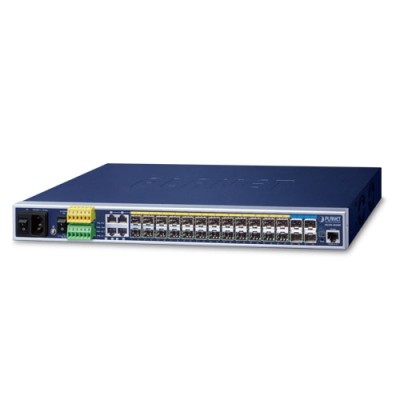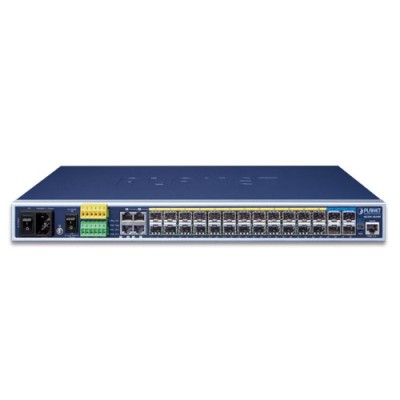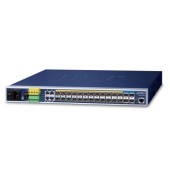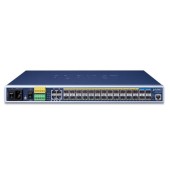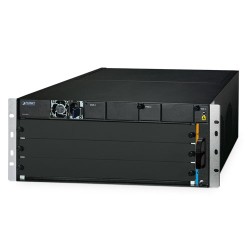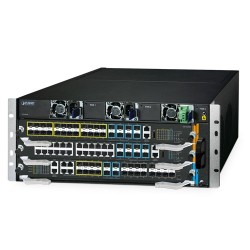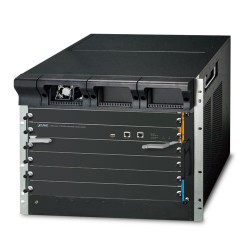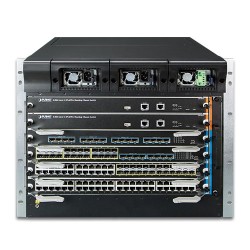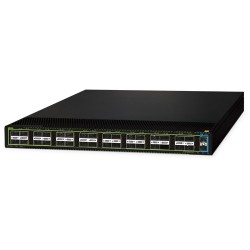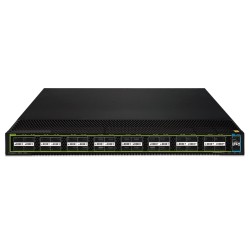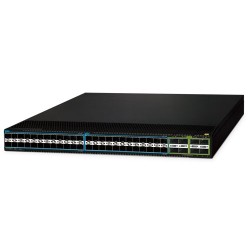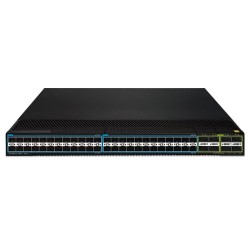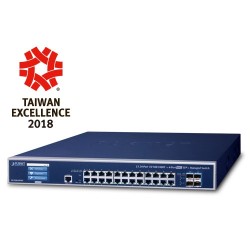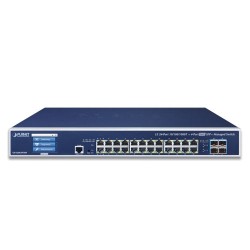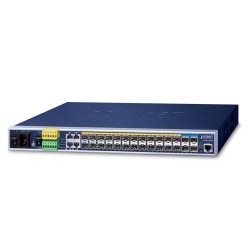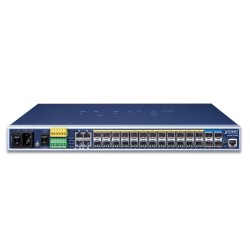- Διαθεσιμοτητα: Άμεσα Διαθέσιμο
- Κατασκευαστης: PLANET
- Κωδικος Προϊοντος: MGSW-28240F
- Βαρος: 3.86kg
10Gbps Fiber Ports and Multiple Triple Speed Fiber Ports Deliver High-speed Networking
PLANET MGSW-28240F L3 24-Port 100/1000BASE-X SFP + 4-Port 10G SFP+ Metro Ethernet Switch is specially designed for service providers and enterprises to deliver high-speed networking over longer distances. Its SFP+ and SFP fiber optic ports can be connected to various fiber and Ethernet cables to extend switching functionality throughout the network. The MGSW-28240F is capable of providing non-blocking switch fabric and wire-speed throughput as high as 158Gbps in the temperature range from -10 to 60 degrees C without any packet loss and cyclic redundancy check (CRC) error. It greatly simplifies the tasks of upgrading the enterprise LAN for catering to increasing bandwidth demands.
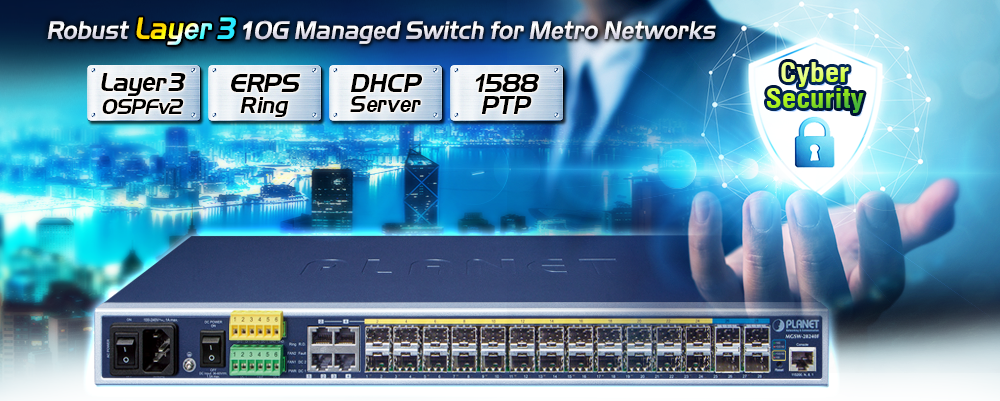
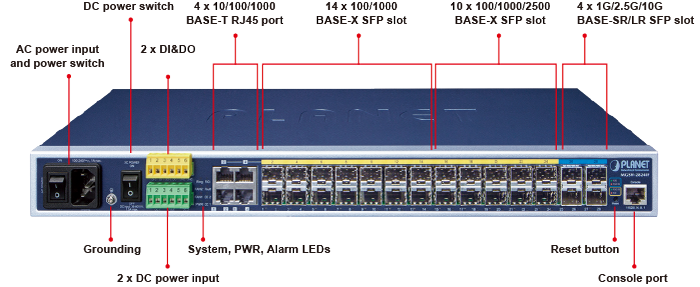
Flexible and Extendable Fiber Optic Ethernet Solution
10G Ethernet is a big leap in the evolution of Ethernet. Each of the 10G SFP+ ports in the MGSW-28240F supports triple speed, 10GBASE-SR/LR, 2500BASE-X and 1000BASE-SX/LX SFP transceiver modules. With its 4-port, 10Gbps and up to 24-port 1Gbps/2.5Gbps fiber optic Ethernet link capability, the administrator now can flexibly choose the suitable SFP and SFP+ transceiver according to the transmission distance or the transmission speed required to extend the network efficiently. The MGSW-28240F provides broad bandwidth and powerful processing capacity.
Front-access Interface Design
The Metro Ethernet Switch comes with a user-friendly front-access design to help technicians improve wiring and installation efficiency, whereas, in the traditional design, the power socket, console port and even some extension module were always placed on the rear of the product. When technicians are installing or maintaining the older switch model on the rack, they have to be careful with other surrounding online devices as the rear-end of the product cannot be seen clearly. With the front-access design, technicians can avoid messing with other nearby devices.
Layer 3 Routing Support
The MGSW-28240F enables the administrator to conveniently boost network efficiency by configuring Layer 3 IPv4/IPv6 VLAN static routing manually, and the IPv4 OSPFv2 (Open Shortest Path First) settings automatically. The OSPF is an interior dynamic routing protocol for autonomous system based on link state. The protocol creates a database for link state by exchanging link states among Layer 3 switches, and then uses the Shortest Path First algorithm to generate a route table based on that database.
Network with Cybersecurity Helps Minimize Security Risks
The MGSW-28240F comes with enhanced cybersecurity to fend off cyberthreats and cyberattacks, it supports SSHv2, TLSv1.2 and SNMPv3 protocols to provide strong protection against advanced threats. Served as a key point to transmit data to customer's critical equipment in a business network, the cybersecurity feature of the MGSW-28240F protects the switch management and enhances the security of the mission-critical network without any extra deployment cost and effort.
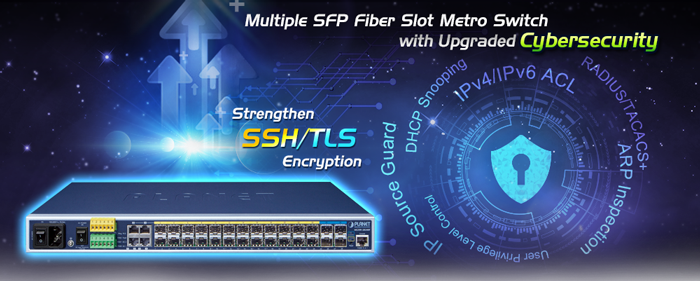
Redundant Ring, Fast Recovery for Critical Network Applications
The MGSW-28240F supports redundant ring technology and features strong, rapid self-recovery capability to prevent interruptions and external intrusions. It incorporates advanced ITU-T G.8032 ERPS (Ethernet Ring Protection Switching) technology, Spanning Tree Protocol (802.1s MSTP), and redundant power input system into customer’s industrial automation network to enhance system reliability and uptime in harsh factory environments. In a certain, simple Ring network, the recovery time of data link can be as fast as 10ms.
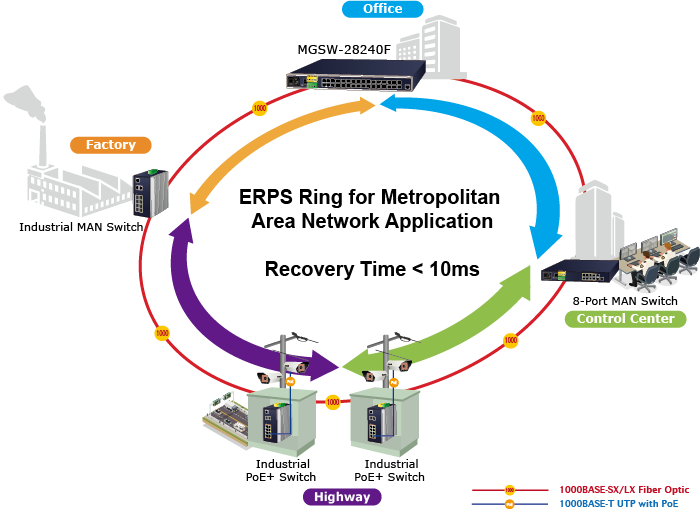
AC and DC Redundant Power to Ensure Continuous Operation
The MGSW-28240F possesses a 100~240V AC power supply and dual 36~60V DC power supply utilized as redundant power supply to ensure its continuous operation. Its redundant power system is specifically designed to handle the demands of high-tech facilities requiring the highest power integrity. Furthermore, with the 36~60V DC power supply implemented, the MGSW-28240F can be applied as the telecom level device and placed in almost any difficult environment.
Digital Input and Digital Output for External Alarm
The MGSW-28240F helps the network administrators efficiently manage the unexpected network situations by providing Digital Input and Digital Output for external alarm device on the front panel. The Digital Input can be used to detect and log the status of the external devices such as door intrusion detector. The Digital Output could be used to send alarm whenever the MGSW-28240F has port link-down or power failure.
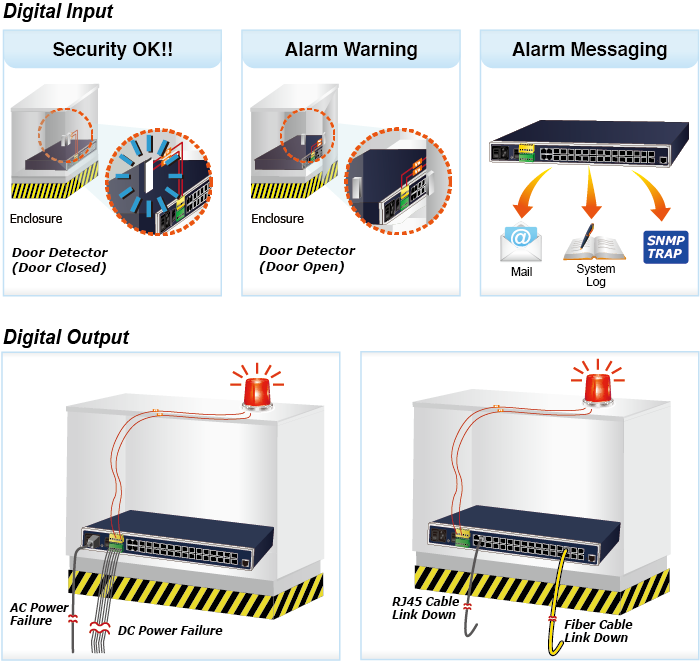
IPv6/IPv4 Dual Stack and Layer 2 Capability
Supporting both IPv6 and IPv4 protocols, the MGSW-28240F helps data centers, campuses, telecoms, and more to experience the IPv6 era with the lowest investment as its network facilities need not be replaced or overhauled if the IPv6 FTTx edge network is set up. The MGSW-28240F can be programmed for advanced switch management functions such as dynamic port link aggregation, Q-in-Q VLAN, private VLAN, Multiple Spanning Tree Protocol (MSTP), Layer 2 to Layer 4 QoS, bandwidth control and IGMP/MLD Snooping. Via the link aggregation of supporting ports, the MGSW-28240F allows the operation of a high-speed trunk to combine with multiple fiber ports and supports fail-over as well.

Powerful Network Security
The MGSW-28240F offers a comprehensive Layer 2 to Layer 4 Access Control List (ACL) for enforcing security to the edge. It can be used to restrict network access by denying packets based on source and destination IP address, TCP/UDP ports or defined typical network applications. Its protection mechanism also comprises 802.1X port-based and MAC-based user, and device authentication. With the private VLAN function, communication between edge ports can be prevented to ensure user privacy.
Advanced IP Network Protection
The MGSW-28240F also provides DHCP Snooping, IP Source Guard and Dynamic ARP Inspection functions to prevent IP snooping from attack and discard ARP packets with invalid MAC address. The network administrators can now construct highly-secure corporate networks with considerably less time and effort than before.
Excellent Traffic Control
The MGSW-28240F is loaded with powerful traffic management and QoS features to enhance connection services by telecoms and ISPs. The QoS features include wire-speed Layer 4 traffic classifiers and bandwidth limit that are particularly useful for multi-tenant units, multi-business units, Telco and network service providers’ applications. It also empowers the industrial environment to take full advantage of the limited network resources and guarantees the best performance in VoIP and video conferencing transmission.
User-friendly and Efficient Switch Management
For efficient management, the MGSW-28240F is equipped with command line, Web and SNMP management interfaces.
- With the built-in Web-based management interface, it offers an easy-to-use, platform-independent management and configuration facility.
- For text-based management, it can be accessed via Telnet and the console port. It offers Cisco-like command that helps users don’t need to learn new command from these switches
- For standard-based monitor and management software, it offers SNMPv3 connection which encrypts the packet content at each session for secure remote management.
Moreover, the MGSW-28240F offers secure remote management by supporting SSHv2, TLSv1.2 and SNMPv3 connections which encrypt the packet content at each session.

Intelligent SFP Diagnosis Mechanism
The MGSW-28240F supports SFP-DDM (Digital Diagnostic Monitor) function that greatly helps network administrator to easily monitor real-time parameters of the SFP, such as optical output power, optical input power, temperature, laser bias current, and transceiver supply voltage.
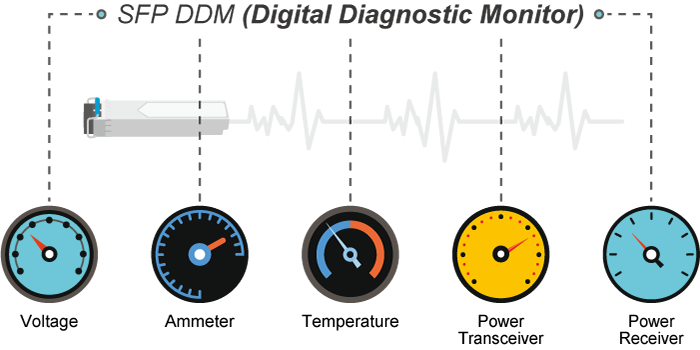
Excellent Solution to Core/Department Network
The MGSW-28240F is an excellent choice of core layer switch for a Gigabit network. With multi-Gigabit ports, the MGSW-28240F is able to connect up to 24 edge switches in the Ethernet environment. Moreover, it also provides 158 Gigabit per second switch fabric and high bandwidth for backbone connection.
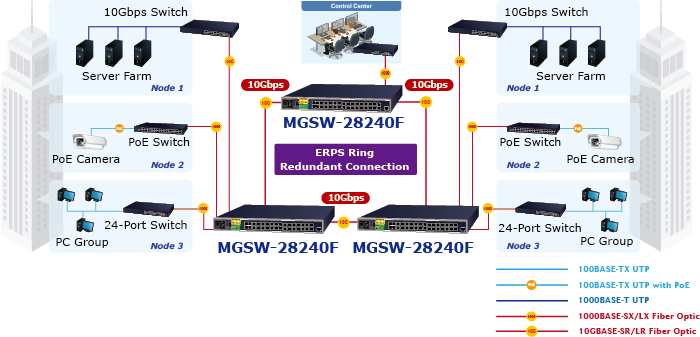
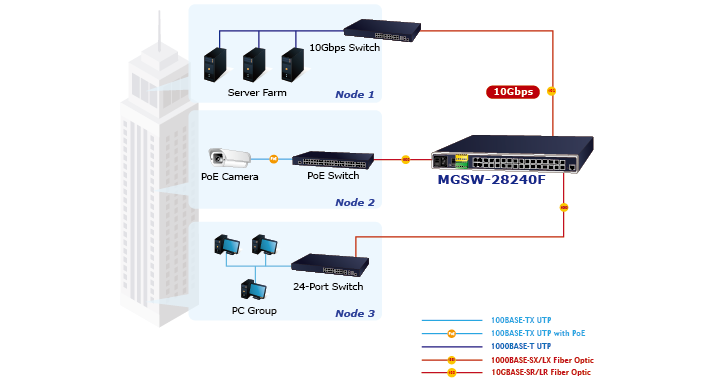
Physical Port
- 14 100/1000BASE-X SFP ports
- 10 100/1000/2500BASE-X SFP ports
- 4 10/100/1000BASE-T RJ45 ports, shared with Port-1 to Port-4
- 4 10GBASE-SR/LR SFP+ slots, compatible with 1000BASE-SX/LX/BX and 2500BASE-X SFP
- RJ45 to RS232 DB9 console interface for basic management and setup
Hardware Conformance
- One 100 to 240V AC or dual 36 to 60V DC power input, redundant power with reverse polarity protection
- 19-inch rack-mountable design
- IP30 metal case
- -10 to 60 degrees C operating temperature
Digital Input and Digital Output
- 2 digital input (DI)
- 2 digital output (DO)
- Integrates sensors into auto alarm system
- Transfers alarm to IP network via email and SNMP trap
Layer 3 IP Routing Features
- IP dynamic routing protocol supports OSPFv2
- Routing interface provides per VLAN routing mode
- Supports maximum 128 static routes and route summarization
Layer 2 Features
- Store-and-forward architecture with runt/CRC filtering that eliminates erroneous packets to optimize the network bandwidth
- Storm control support
- Broadcast/Multicast/Unknown unicast
- Supports VLAN
- IEEE 802.1Q tagged VLAN
- Provides Bridging (VLAN Q-in-Q) support (IEEE 802.1ad)
- Private VLAN Edge (PVE)
- Protocol-based VLAN
- MAC-based VLAN
- IP subnet-based VLAN
- Voice VLAN
- GVRP(GARP VLAN Registration Protocol)
- Supports Spanning Tree Protocol
- IEEE 802.1D Spanning Tree Protocol (STP)
- IEEE 802.1w Rapid Spanning Tree Protocol (RSTP)
- IEEE 802.1s Multiple Spanning Tree Protocol (MSTP), spanning tree by VLAN
- BPDU Guard
- Supports Link Aggregation
- 802.3ad Link Aggregation Control Protocol (LACP)
- Cisco ether-channel (static trunk)
- Maximum 14 trunk groups, with 16 ports for each trunk group
- Up to 80Gbps bandwidth (full duplex mode)
- Provides port mirror (many-to-1)
- Port mirroring monitors the incoming or outgoing traffic on a particular port
- Loop protection to avoid broadcast loops
- Supports ERPS (Ethernet Ring Protection Switching)
- IEEE 1588 Transparent Clock mode and Synchronous Ethernet network timing
Quality of Service
- Ingress Shaper and Egress Rate Limit per port bandwidth control
- 8 priority queues on all switch ports
- Traffic classification
- IEEE 802.1p CoS
- TOS/DSCP/IP Precedence of IPv4/IPv6 packets
- IP TCP/UDP port number
- Typical network application
- Strict priority and Weighted Round Robin (WRR) CoS policies
- Supports QoS and In/Out bandwidth control on each port
- Traffic-policing on the switch port
- DSCP remarking
Multicast
- Supports IPv4 IGMP snooping v1, v2 and v3
- Supports MLD snooping v1 and v2
- Querier mode support
- IGMP snooping port filtering
- MLD snooping port filtering
- MVR (Multicast VLAN Registration)
Security
- Authentication
- IEEE 802.1x port-based/MAC-based network access authentication
- IEEE 802.1x authentication with guest VLAN
- Built-in RADIUS client to cooperate with the RADIUS servers
- RADIUS/TACACS+ users access authentication
- Access Control List
- IP-based Access Control List (ACL)
- MAC-based Access Control List (ACL)
- Source MAC/IP address binding
- DHCP Snooping to filter distrusted DHCP messages
- Dynamic ARP Inspection discards ARP packets with invalid MAC address to IP address binding
- IP Source Guard prevents IP spoofing attacks
- IP address access management to prevent unauthorized intruder
Management
- IPv4 and IPv6 dual stack management
- Switch Management Interfaces
- Console/Telnet command line interface
- Web switch management
- SNMP v1, v2c, and v3 switch management
- SSHv2 and TLSv1.2 secure access
- IPv6 address/NTP management
- Built-in Trivial File Transfer Protocol (TFTP) client
- BOOTP and DHCP for IP address assignment
- System Maintenance
- Firmware upload/download via HTTP/TFTP
- Reset button for system reboot or reset to factory default
- Dual images
- DHCP relay and option 82
- User privilege levels control
- NTP (Network Time Protocol)
- Link Layer Discovery Protocol (LLDP) and LLDP-MED
- Network diagnostic
- SFP-DDM (Digital Diagnostic Monitor)
- Cable diagnostic technology provides the mechanism to detect and report potential cabling issues
- ICMPv6/ICMPv4 remote ping
- SMTP/Syslog remote alarm
- Four RMON groups (history, statistics, alarms and events)
- SNMP trap for interface link up and link down notification
- System Log
- PLANET Smart Discovery Utility for deployment management
| Hardware Specifications | |
|---|---|
| Copper Ports | 4 10/100/1000BASE-T RJ45 auto-MDI/MDI-X ports, shared with Port-1 to Port-4 |
| SFP Ports | 14 100/1000BASE-X SFP interfaces (Port-1 to Port-14) Compatible with 100BASE-FX SFP transceiver 10 100/1000/2500BASE-X SFP interfaces (Port-15 to Port-24) Compatible with 100BASE-FX and 2500BASE-X SFP transceiver |
| SFP+ Ports | 4 10GbBASE-SR/LR SFP+ interfaces (Port-25 to Port-28) Compatible with 1000BASE-SX/LX/BX and 2500BASE-X SFP transceiver |
| Console | 1 x RS232-to-RJ45 serial port (115200, 8, N, 1) |
| Reset Button | < 5 sec: System reboot > 5 sec: Factory default |
| Dimensions (W x D x H) | 440 x 200 x 44.5 mm, 1U height |
| Weight | 2.935kg |
| Power Consumption | AC input: Max. 36.5 watts/125.2 BTU DC input: Max. 38.7 watts/132.7 BTU |
| Power Requirements – AC | AC 100~240V, 50/60Hz 1A |
| Power Requirements – DC | DC 36~60V, 1.5A |
| DI and DO | 2 digital input (DI): Level 0: -24~2.1V Level 1: 2.1~24V Max. input current: 10mA 2 digital output (DO): Open collector to 24VDC, 100mA |
| EFT Protection | 6KV DC |
| ESD Protection | 6KV DC |
| LED Indicator | System: PWR (Green), DC1 (Green), DC2 (Green), Fault (Red) Ring (Green), R.O. (Green) 10/100/1000T RJ45 Interfaces (Port 1 to Port 4): 1000Mbps LNK/ACT (Green) 10/100Mbps LNK/ACT (Amber) 100/1Gbps SFP Combo Interfaces (Port 1 to Port 14): 1000Mbps LNK/ACT (Green) 100Mbps LNK/ACT (Amber) 100/1G/2.5Gbps SFP Combo Interfaces (Port 15 to Port 24): 1G/2.5Gbps LNK/ACT (Green) 100Mbps LNK/ACT (Amber) 1G/2.5G/10Gbps SFP+ Interfaces (Port 25 to Port 28): 10Gbps LNK/ACT (Green) 1G/2.5Gbps LNK/ACT (Amber) |
| Switching Specifications | |
| Switch Architecture | Store-and-Forward |
| Switch Fabric | 158Gbps/non-blocking |
| Throughput | 117Mpps@64Bytes |
| Address Table | 32K entries, automatic source address learning and aging |
| Shared Data Buffer | 32M bits |
| Flow Control | IEEE 802.3x pause frame for full duplex Back pressure for half duplex |
| Jumbo Frame | 10K bytes |
| Layer 3 Functions | |
| IP Interfaces | Max. 128 VLAN interfaces |
| Routing Table | Max. 128 routing entries |
| Routing Protocols | IPv4 hardware static routing IPv6 hardware static routing OSPFv2 dynamic routing |
| Layer 2 Management Functions | |
| Port Configuration | Port disable/enable Auto-negotiation 10/100/1000Mbps full and half duplex mode selection Flow control disable/enable |
| Port Status | Display each port’s speed duplex mode, link status, flow control status, auto-negotiation status, trunk status |
| Port Mirroring | TX/RX/Both Many-to-1 monitor |
| VLAN | IEEE 802.1Q tagged VLAN IEEE 802.1ad Q-in-Q tunneling Private VLAN Edge (PVE) MAC-based VLAN Protocol-based VLAN Voice VLAN IP Subnet-based VLAN MVR (Multicast VLAN registration) Up to 4K VLAN groups, out of 4096 VLAN IDs GVRP |
| Link Aggregation | IEEE 802.3ad LACP/static trunk 14 trunk groups with 16 ports per trunk group |
| Spanning Tree Protocol | IEEE 802.1D Spanning Tree Protocol IEEE 802.1w Rapid Spanning Tree Protocol IEEE 802.1s Multiple Spanning Tree Protocol |
| QoS | Traffic classification based, strict priority and WRR 8-level priority for switching: Port number 802.1p priority 802.1Q VLAN tag DSCP/ToS field in IP packet |
| IGMP Snooping | IGMP (v1/v2/v3) snooping, up to 255 multicast groups IGMP querier mode support |
| MLD Snooping | MLD (v1/v2) snooping, up to 255 multicast groups MLD querier mode support |
| Bandwidth Control | Per port bandwidth control Ingress: 100Kbps~1000Mbps Egress: 100Kbps~1000Mbps |
| Ring | Supports ERPS, and complies with ITU-T G.8032 Recovery time < 10ms |
| Synchronization | IEEE 1588v2 PTP (Precision Time Protocol) Peer-to-peer transparent clock End-to-end transparent clock |
| Security Functions | |
| Access Control List | IP-based ACL/MAC-based ACL ACL based on: MAC Address IP Address Ethertype Protocol Type VLAN ID DSCP 802.1p Priority Up to 256 entries |
| Security | Port security IP source guard Dynamic ARP inspection Command line authority control based on user level |
| AAA | RADIUS client TACACS+ client |
| Network Access Control | IEEE 802.1x port-based network access control MAC-based authentication Local/RADIUS authentication |
| Switch Management | |
| Basic Management Interfaces | Local console and Telnet Web browser SNMP v1, v2c |
| Secure Management Interfaces | SSHv2 TLSv1.2 SNMPv3 |
| System Management | Firmware upgrade by HTTP protocol through Ethernet network Configuration upload/download through HTTP Remote syslog System log LLDP protocol NTP PLANET Smart Discovery Utility PLANET NMS-500 and NMS-1000V hardware-based controller PLANET CloudViewer app |
| Event Management | Remote syslog Local system log SMTP |
| SNMP MIBs | RFC 1213 MIB-II RFC 1493 Bridge MIB RFC 1643 Ethernet MIB RFC 2863 Interface MIB RFC 2665 Ether-Like MIB RFC 2819 RMON MIB (Group 1, 2, 3 and 9) RFC 2737 Entity MIB RFC 2618 RADIUS Client MIB RFC 2863 IF-MIB RFC 2933 IGMP-STD-MIB RFC 3411 SNMP-Frameworks-MIB RFC 4292 IP Forward MIB RFC 4293 IP MIB RFC 4836 MAU-MIB IEEE 802.1X PAE LLDP |
| Standards Conformance | |
| Regulatory Compliance | FCC Part 15 Class A, CE |
| Standards Compliance | IEEE 802.3 10BASE-T IEEE 802.3u 100BASE-TX/100BASE-FX IEEE 802.3z Gigabit SX/LX IEEE 802.3ab Gigabit 1000T IEEE 802.3bz 2.5GBASE-X IEEE 802.3ae 10Gb/s Ethernet IEEE 802.3x flow control and back pressure IEEE 802.3ad port trunk with LACP IEEE 802.1D Spanning Tree Protocol IEEE 802.1w Rapid Spanning Tree Protocol IEEE 802.1s Multiple Spanning Tree Protocol IEEE 802.1p Class of Service IEEE 802.1Q VLAN tagging IEEE 802.1X Port Authentication Network Control IEEE 802.1ab LLDP RFC 768 UDP RFC 793 TFTP RFC 791 IP RFC 792 ICMP RFC 2068 HTTP RFC 1112 IGMP v1 RFC 2236 IGMP v2 RFC 2328 OSPF v2 RFC 3376 IGMP v3 RFC 2710 MLD v1 RFC 3810 MLD v2 ITU G.8032 Ethernet Ring Protection Switching |
| Environment | |
| Operating | Temperature: -10 ~ 60 degrees C for AC power input -40 ~ 75 degrees C for DC power input Relative Humidity: 5 ~ 95% (non-condensing) |
| Storage | Temperature: -40 ~ 80 degrees C Relative Humidity: 5 ~ 95% (non-condensing) |
Datasheet
| Date | Version | Description | Download |
|---|---|---|---|
| 2021-11-19 | 3.0 | MGSW-28240F |
|
Firmware
Quick Guide
User's Manual
| Date | Version | Description | Download |
|---|---|---|---|
| 2022-03-18 | 1.7 | [Command Guide] Updated. |
|
| 2019-02-15 | 3.0 | Release for hardware version 3.0. |
|
EC Declaration
| Date | Version | Description | Download |
|---|---|---|---|
| 2022-01-22 | 1.2 | EC Declaration. |
|

